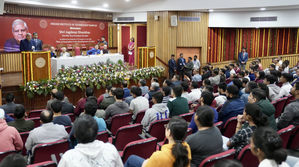Starlink services may be available in South Korea next year
Seoul, Oct 15 (IANS) US space firm SpaceX may launch its Starlink satellite internet services in South Korea next year, industry sources said on Tuesday.
According to the sources, the science ministry had notified the revisions of related regulations for Starlink’s internet services.
After a six-month period, the science ministry will launch the process for the approval of a deal between SpaceX and its Korean unit, Starlink Korea, reports Yonhap news agency.
The sources said once all required processes are completed, SpaceX will launch the satellite internet service here early next year.
Starlink offers high-speed, low-latency internet service to users all over the world using a low-Earth orbit.
The affordable internet service Starlink is now operational on more than 1,000 aircraft, according to SpaceX and Tesla CEO Elon Musk.
Starlink keeps passengers connected with high-speed internet from the moment they step onboard their plane. The global satellite communications (satcom) services provider has expanded its services to 105 countries. In May, the company launched Starlink in Indonesia and Fiji. According to Musk, no long-term contract is required to order the high-speed internet service with Starlink.
The satellite-based internet service has also received preliminary approval from Sri Lanka to provide internet service in the island nation. However, the internet service has yet to receive approval from the Indian government.
Starlink engineering teams have been focused on improving the performance of our network with the goal of delivering a service with stable 20 millisecond (ms) median latency and minimal packet loss.
According to the company, they have meaningfully reduced median and worst-case latency for users around the world.
In the US alone, “we reduced median latency by more than 30 per cent, from 48.5ms to 33ms during hours of peak usage”, according to Starlink.
Outside of the US, “we have also reduced median latency by up to 25 per cent and worst-case latencies by up to 35 per cent,” said the company.
–IANS
na/




